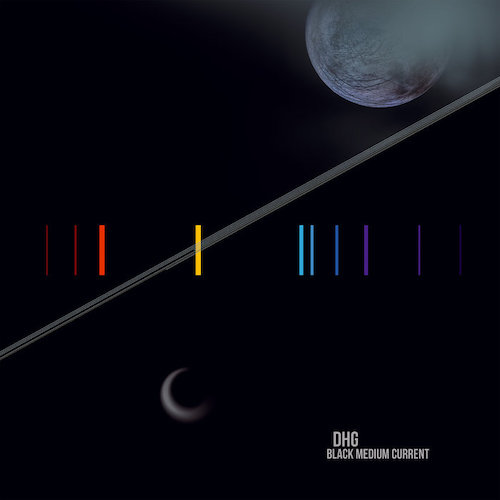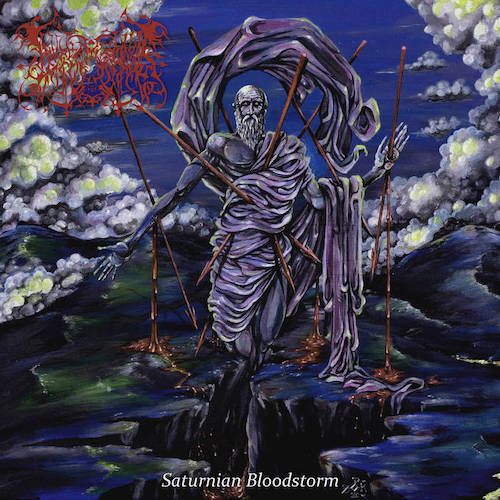For the twentieth edition of this column, we are doing something slightly different. Why? Well, to be honest, my listening habits have taken a detour of late and instead of diving into a million different things, I am concentrating way too hard on a handful of releases. And these two have stood out the most over the last month or so. They have some things in common -- one is Norwegian and one is paying homage to the Norwegian scene; they are both experimental in their own way; and they are both revered despite the different approaches and length of their careers. So, why not?
Dødheimsgard– Black Medium Current (Peaceville Records)

Listen, I’m not going to pretend to know what the hell is happening on Black Medium Current, or with Dødheimsgard in general -- I'm just here to talk about good records. These Norwegians have been laying waste to the musical landscape for longer than most and each time they release a new album it signals a rebirth, a renewal and a reenergising of their sound. The weirdness that permeates their work is still present, however, and Dødheimsgard are not shy about injecting their music with curious sound patterns or bizarro vocals -- courtesy of Vicotnik -- while keeping a delicious sense of melody.
Opener “Et Smelter” features all of those elements and more as Black Medium Current stakes its place within the modern black metal world as an album of rejuvenation and alchemy. The song punctuates the air with cosmic keys and Vicotnik’s supremely varied vocal offerings as it takes several turns into what the musical sphere offers, taking black metal as its base yet finding detours on the way. Avant-garde is the most obvious description one can find for this band and it is fitting although a little reductive. They are so much more than that, as following track “Tankespinnerens Smerte” demonstrates. Vocals are rendered in a clean style for much of the song as though a heavenly choir that has fallen from grace is soundtracking the demise of the narrator. It’s fantastical in nature, the lyrics often creating images in your mind of vast spaces of decay filled with abstract shapes that beg to be released from the ether. Dødheimsgard are masters of the creation of worlds and their thematic content is rife with metaphors and symbolism.
This makes dissecting the record a work in itself and where Black Medium Current succeeds is that at no point does it feel overwhelming, or rather, overbearing. There are moments of genuine wonder as to how they took certain turns -- such as the unexpected trippiness during “Interstellar Nexus” and its backflip into something else entirely, or the curious ‘70s lounge vibe that drifts through “It Does Not Follow.” It must be heard to be believed, quite honestly, and as the melancholy tones of “Voyager” cascade amidst a break in the madness, there is a sense that the album is much more than first impressions allow for.
The sadness continues as the album moves forward. “Halow,” a highlight of the record, swirls with a palpable anguish as Vicotnik mixes both his native tongue and English, with clean vocals and gruffer notes to delve even further into the maelstrom that is life. Black Medium Current feels as dynamic as the cyclical nature of existence, with rebirth and death featuring heavily throughout and the music following patterns of quietude and radiance. Songs are able to flow freely between these states as Dødheimsgard manipulate the universe to adapt to them, rather than the other way around, and adapt it does. Where “Abyss Perihelion Transit” begins on somewhat gentler tones and a whispered vocal, it soon diverges into celestial synths and a harsher voice before the final track “Requiem Aeternum” ramps up the eeriness with echoing intonations and mournful strings. It is a quiet end to an otherwise bombastic album and if we follow the cycle then we know it ends with death. Here we are able to embrace the end with grace and poise, rather than anger and Dødheimsgard prove once again that they are more than a band, they are a lifeforce.
Lamp Of Murmuur – Saturnian Bloodstorm (Not Kvlt/Night Of The Palemoon/Argento Records/Wolves of Hades)

For their third full-length, solo black metal project Lamp Of Murmuur steps back from the gothic tinges of their last record, and fully embraces the ice storm of the genre’s second wave and Immortal’s snow-clad atmosphere. It’s a surprising deviation, not least because the post-punk elements of their first two albums were highly praised. But, maybe because of this, M. -- the sole member of the recording line-up -- has chosen to pivot to a sound that places him firmly in the early ‘90s.
M. has commented in interviews that this album is partly Immortal worship and the upfront nature of this allows for a more immersive listen. Rather than thinking the entire time about what exactly this album is reminiscent of, you are able to go into it with that information and enjoy Saturnian Bloodstorm for exactly what it is -- a vibrant, exciting foray into new dimensions for an artist who is constantly evolving their sound. For some this is a travesty, blasphemy even, as if M. and his music owes some basement dweller an explanation or their art, but hey, that’s the internet for you. I’m sure you’ll find many discontented with the direction of this new Lamp of Murmuur album but I’m not one of them.
The energy on Saturnian Bloodstorm is urgent, feral almost, as though M. is desperately trying to keep back from the abyss and is using every ounce of their being to be able to break free from the chains of bondage and stop from being pushed deeper into the darkness. Looking at the information that M. has allowed to be put out about the album and the fact that he was/is in too much pain to drum on the album (all drums are programmed here), the twist into new avenues seems to be a necessity for their health and physical well-being. It can also be imagined that having to find new routes to channel a vision is difficult as M. has previously stated that Lamp Of Murmuur’s music is automatic, it comes to him from elsewhere, nowhere, and so not being able to immediately drum out those patterns must be frustrating. Those emotions can be felt on the album during the frenetic opening of “Conqueror Beyond the Frenzied Fog” or the staccato riff that permeates “In Communion With the Wintermoon” as the songs push for control over the uncontrollable.
Darkness has long been a large part of the Lamp Of Murmuur sound, yet here it feels as though it is being used as an instrument rather than as atmosphere. M. uses the darkness that surrounds him personally to drive the songs into new territories for the band as “Seal of the Dominator” demonstrates through a different vocal approach than we are used to from the band. Deeper registers and a gruffer delivery are used in favour of the higher pitched shrieks and clean singing that has previously been heard on Lamp Of Murmuur’s work and the lower tones fit the new direction perfectly. The aura is one of oppression and being weighed down by obstacles that you have no control over. The imagery in the lyrics is almost biblical -- the sight of the heavens opening and huge battles being fought in thunderous arenas is devilishly tangible on the closing track “Saturnian Bloodstorm,” and as the song reaches its crescendo, keyboards swirling around the rampant guitars and M.’s roars, we hear Lamp Of Murmuur reach their zenith -- the firmament is shattered and M. is victorious.








